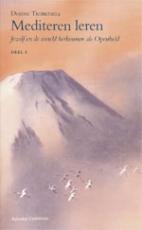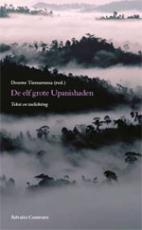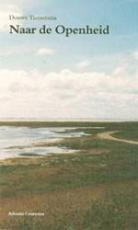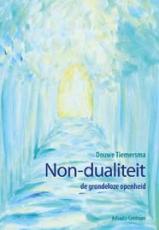Advaita Post #16-01 - the courage to see reality
January 1, 2015
Text Satsang
From a talk with Douwe Tiemersma, in Gouda December 9, 1981 (In: Yoga and Vedanta 24 No. 2 (June 1982), 56-58)
The courage to see reality
We have often talked about the trust that is needed to let go of the last 'I' tension. Sometimes there is complete trust, just like that. Then the realization is direct. If the surrender is not yet complete, it may be helpful to realize that you have to be brave to let go of everything, to have trust in that which offers no hold. I'd like to begin with that tonight. When everything breaks open it happens by itself. You can't help it. But you can realize that you have the courage for it. On the one hand there is the tendency to hold on to everything. That is the work of the fear. On the other hand you can see that there is nothing to hold on to and you can have the courage to accept that. The 'I' with its whole world and its fears is just an artificial idea. When you have the courage for it you can see that directly. To see reality, to face the real situation, courage is needed. Again and again there is the defensive reaction to put blinders on, to see everything through the prism of the past. As it was then, it is now also. These are the ideas that spread insidiously: I am this body, I am this and that. The nature of this situation must be clearly faced. See the diversionary tactics, through which you don't see reality as it is. You say: "I am not ready for it" and you look no further than your own nose. You say: "The circumstances are wrong" and you look beyond yourself. The point is that you don't have the courage to look reality in the eye, to look yourself in the eye. Again and again there is the fearful reaction to hide behind the past, to hide the present in the past. When you look clearly, you see that everything is a personal mode of thinking, of giving form and you can easily let go of that. Only, there is so much energy packed into that old way of thinking, there are so many personal feelings attached to it. Old wine in old wineskins and new wine in old wineskins. But they are just ideas, translucent, worn out until completely threadbare. You pick them up between your thumb and forefinger and let them go. And you can do that, when you dare to see their true value, when you dare to see that you are not stuck anywhere, that you are not limited, that you are formless. Dare to see that reality. Then the last tension of the 'I' disappears. When you truly believe, trust, have courage, then anything is possible. Nothing is impossible. And why wouldn't you have that? Why would you remain a pitiful, cowering little bird that doesn't dare to fly? It clings to the firm but limited ground. When it doesn't fly, it quickly becomes a prey for predators. You can fly. Why don't you do it? Maybe you know the story of the man who after his life sees a gate. He knows: I must go in there. But he also sees the heavily armed gatekeeper and is afraid. He thinks: I'll wait until the guard is gone, and sits down on a bench. He waits years and years, centuries and centuries. Occasionally he looks at the grim guard, but doesn't dare to go up to him. At some point, the guard asks: Why don't you go in? Nobody's holding you back. But now it is too late, the gate is permanently closed. It is ideas, horror images that you, yourself, have created and which evoke fearful reactions in you. You hold yourself back because you distort reality through your own self-evoked fear. It is based on nothing. It is like people who always walk crookedly, they look down and say: the world is so gloomy and bad. They can also look up: the blue sky is there, if you just look in an open way. It's the most natural thing there is. Only the unnatural comes through the formation of the I-tension. The head is stuck in the sand. It's too crazy. You're not all ostriches are you? Reality is there, dare but to look. That doesn't mean personal courage, but courage in the form of a surrender that overcomes the limitations of the personal standpoint. Why not?
Last time you said: You must do it yourself. I can see that now. I see now that I can't sit here forever. I like to come, but there's something in me that's trying to free me of it. Something has happened. I spent the whole week sitting in my chair and I wasn't bored. Only my back became a little sore. I don't understand it myself, but it doesn't really matter to me how things go from now on.
It's no longer necessary for you to come here. Go your way. Stay lucid and stick to the point: nothing more needs to happen.
When a child is raised in a family, it comes to the age in which it's going to stand on its own two feet. It wouldn't be good to depend on the parents any longer. The same applies to anyone who keeps on walking by holding onto crutches longer than necessary. When the most important thing has happened, the rest comes automatically. When the recognition is there, nothing more needs to happen. Truly everything can and should happen. Then everything is accepted, just as it happens.
Are there then no tensions, even distant ones?
When the engine of the 'I' is disconnected, you see the car slowly coasting, until it comes to a standstill. Realize that you're an adult. Then whatever still belongs to childhood disappears. Didn't you used to worry about all sorts of things that you no longer worry about now? Didn't that happen by itself? At a certain stage it's good to focus entirely on your parents and devote yourself to religion. But at a different stage, beyond the personal level, you realize: I am not dependent on anyone or anything. You will not serve other gods, no gods outside of you, and no little personal 'I' either. No image or form will be taken absolutely. Then the 'I' is universal, infinitely extended. Then you are Self-reliant until that, too, disappears. The Ultimate has no form. There is nothing for you to cling to or depend on. That would become an idol. It cannot be anything other than yourSelf. You realize It through yourSelf alone. Openness for everything and everyone, Love, above and beyond feelings. Just have the courage to let it happen.
I see my own situation, but aren't seeing and letting go two different things?
Look at your own situation a little more and try thereby to look even more clearly, honestly, with less and less involvement. Ask yourself: I am that? And realize who you, as observer, are. What you really are. Then letting go is no longer an issue.
Here, it works great, but in everyday life there is not much insight left over.
Because you don't dare to see that in your daily working life too, everything happens by itself in the open space. You shield yourself off again when you have to deal with others, you dive back into your own homemade little person. When you see that now, then keep seeing that clearly when you open the door to your office and later. Stay lucid and courageous, and have trust in the Openness.
********
Er is geen tweeheid
als je ontspannen bent
in zelf-bewustzijn
is dat duidelijk.
Boeken
Douwe schreef en redigeerde gedurende zijn leven boeken. Via onze uitgeverij zijn deze nog verkrijgbaar.



